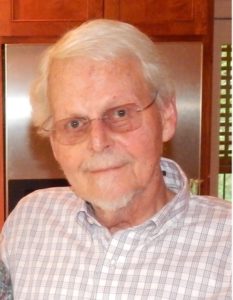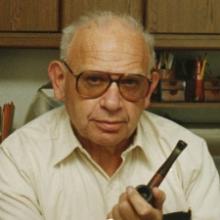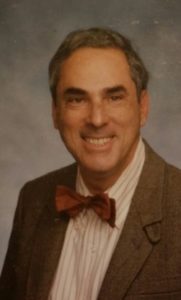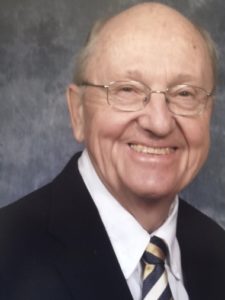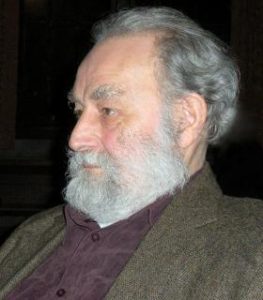William Creighton Peden, III (1935-2016)
William Creighton Peden, III was born July 25, 1935 in Concord, North Carolina. He received a B.A. from Davidson College in 1957, an M.A. in Theology in 1960 and an M.A. in Divinity in 1962 from the University of Chicago, and a Ph.D. in 1965 from St. Andrews University, Scotland. Peden was the Fuller E. Callaway Professor of Philosophy at Augusta University, where he remained in residence until 1990. At Augusta, he designed and directed the Cullum Third World Culture Program, which was selected in 1979 as one of the ten most innovative programs by the American Association of State Colleges and Universities. He was the founding executive director of the Georgia Consortium for International Education (1970-1973), served on state and national panels for the National Endowment for the Humanities and the Arts, and received numerous research and travel grants.
He retired in August of 2008 after twenty-one years as president of the Highlands Institute for American Religious and Philosophical Thought (now IARPT). Peden was a member of Phi Kappa Phi, the American Philosophical Association, the American Academy of Religion, the North American Society for Social Philosophy, and a Fellow of the Society of Philosophers in America. He chaired fifteen international conferences, served as a United States Information Services professor, and lectured at over forty universities in twelve countries.
Peden was the founding editor of the Journal of Social Philosophy from 1970 to 1983 and the founding co-editor of the American Journal of Theology & Philosophy from 1980 to 1991. Peden also served as a contributing editor for Religious Humanism from 1992 to 2007.
He was founding president of the North American Society for Social Philosophy (1983-1990), was co-editor of ten volumes in the Social Philosophy Today book series, and remained on the editorial boards of Philosophy and Social Criticism, the Journal of Social Philosophy, and the American Journal of Theology and Philosophy.
In addition to his editorial duties, Peden wrote over 100 articles and chapters, as well as being the author or editor of over 20 books, including:
- Wieman’s Empirical Process Philosophy (1977) – author
- H. N. Wieman’s Creative Freedom: Vocation of Liberal Religion (1982) – co-editor with Larry Axel
- H. N. Wieman’s Science Serving Faith (1987) – co-editor with Charles Willig
- Whitehead’s View of Reality (1981) – co-author with Charles Hartshorne
- The Chicago School: Voices of Liberal Religious Thought (1987) – author
- The Philosopher of Free Religion: Francis Ellingwood Abbot, 1836-1903 (1992) – author
- The Chicago School of Theology: Pioneers in Religious Inquiry, Vol. I-II, (1996) – co-editor with J. A. Stone
- The Collected Essays of Francis Ellingwood Abbot (1836-1903), American Philosopher and Free Religionist, Vol. I-IV (1996) – co-editor with E. J. Tarbox, Jr.
- Civil War Pulpit to World’s Parliament of Religion: The Thought of William James Potter, 1829-1893 (1996) – author
- Essays and Sermons of William James Potter (1829-1893), Unitarian Minister and Free-Thinker, Vol. I-II (2003) – co-editor with E. J. Tarbox, Jr.
- A Good Life in a World Made Good, Albert Eustace Haydon, 1880-1975 (2006) – author
- Pragmatism and the Rise of Religious Humanism, The Writings of Albert Eustace Haydon, 1880-1975, Vol. I, II, III (2006) – co-editor with John Gaston
- An Intellectual Biography of David Atwood Wasson (1823-1887): An American Transcendentalist Thinker (2008) – author
- Evolutionary Theist: An Intellectual Biography of Minot Judson Savage, 1841-1918 (2009) – author
- Empirical Tradition in American Liberal Religious Thought, 1860-1960 (2010) – author
- Life and Thought of Bernard Eugene Meland: American Constructive Theologian (2010) – author
- Life and Thought of Henry Nelson Wieman, 1884-1975 (2010) – author
- Christian Pragmatism: An Intellectual Biography of Edward Scribner Ames, 1870-1958 (2011) – author
- From Authority Religion to Spirit Religion: An Intellectual Biography of George Burman Foster, 1875-1918 (2013) – author
- Religion of Democracy: An Intellectual Biography of Gerald Birney Smith, 1868-1929 (2014) – author
- From Evolution to Humanism in 19th & 20th Century America (2015) – author
A Tribute to Creighton Peden by William Dean
“Creighton’s accomplishment was not obvious to the parting glance. Like the editors of Shakespeare’s first folio, who created the only link that made it possible for 13 of Shakespeare’s 36 plays to be performed again, Creighton knew what it took to forestall the death of a legacy. The Shakespeare folio editors knew that time, ‘like an ever-rolling stream,’ could bear great plays away . . . unless they made an effort to preserve them. Like those editors, Creighton did what he could to postpone the disappearance from libraries of a great tradition of American thought.”
Howard Radest (1928-2014)
Howard was active in numerous Humanist and Ethical Cultural organizations, and the author of nine books and numerous articles. He also was an active member of The Highlands Institute for American Religious and Philosophical Thought and presented his intellectual autobiography to the Institute in Highlands, NC several years ago.
Howard is survived by his wife, Rita, of nearly 63 years, two sons, Robert and Michael, their wives and five grandchildren.
Spencer Lavan (1937-2016)
Longtime member of (H)IARPT, Rev. Dr. Spencer Lavan, passed away on September 29, 2016. Spencer was a Unitarian Universalist minister and served as President and Dean of Meadville Lombard Theological School. He authored two books, including Unitarians and India: A Study in Encounter and Response, published in 1991. To read more about Spencer’s life and work, click here.
Donald Klinefelter (1937-2017)
Don Klinefelter, longtime member of IARPT and retired professor at the University of Tennessee, Chattanooga, died on October 10, 2017 at the age of 79. Don participated in the very first HIARPT member’s book seminar, organized around Nancy Frankenberry’s 1987 work, Religion and Radical Empiricism.
Don was born Oct. 19,1937, in Beaver Dam, Wisc. Don’s roots are firmly and lovingly established in the college town of Northfield, Minn., where he graduated from Northfield High School (’55) and from Carleton College (’59). Awarded Danforth and Rockefeller Foundation Fellowships, he received a divinity degree at Chicago Theological Seminary and a Ph.D. from the University of Chicago. Don began his teaching career at Lawrence University, Appleton, Wisc., in 1967, joined the faculty at the University of Tennessee, Chattanooga in 1969, and was a visiting professor at the University of the South, Sewanee, Tenn., 1974-75. He retired from UTC in 2003, after 30-plus years, having taught religion, philosophy, humanities, and medical ethics. He had a special rapport with young people and thoroughly enjoyed his students, his teaching, his colleagues, and many wonderful friends he met on trips and at professional meetings. He was privileged to have spent several semesters at the Ecumenical Institute of St. John’s Abbey in Collegeville, Minn., and a year at Indiana University in Bloomington, Ind. He received UC Foundation awards to study at Harvard, Edinburgh University, and King’s College, London, and traveled as well for study in Poland and India. Don served for many years on the Ethics Committee of Erlanger Hospital; he authored a number of scholarly articles, and he received Distinguished Service and Outstanding Teacher Awards from the College of Arts and Sciences. Don was known for his wonderful sense of humor, generous spirit, insightful teaching, and deep appreciation of all his mentors and opportunities. He often commented on his gratitude for his parents and his hometown. His great loves in life were his entire family, his friends and classmates, travel, his church, listening to the radio and reading newspapers — no computers for this guy! Don was preceded in death by his father and mother, Donald and Hedwig, and brother and sisters-in-law, Tom, Barb and Kathy. He is survived by Elizabeth, whom he married in 1963, daughters, Sara (Jimmy) and Anna (Tom); grandchildren, Trenna, Jacob and Jade; sister, Sandy; brother, Paul (Anne); beloved in-laws and several nieces and nephews.
Gene Reeves (1933-2019)
Colleagues and friends of Gene Reeves are saddened to learn of his death on May 8th, 2019. Gene was a longtime member of IARPT and he will be missed by so many. Although he spent much of his time during the last twenty-five years in Japan, he travelled regularly to meetings in the United States. Lee Barker, President of Meadville Lombard, made this announcement:
“My friend and mentor, Dr. Gene Reeves, died peacefully in his Chicago home last evening. His devoted wife, Yayoi Reeves, was at his side. Gene served as Meadville Lombard Theological School Dean and CEO from 1979 to 1988. Following his service to ML, Gene went to Japan where he taught, published, preached, participated in peacemaking and advised Rissho Kosei-kai leaders on how they could be fuller partners in the international theater of cooperation and understanding. It was in those roles that he developed his great appreciation for the Lotus Sutra which anchored his scholarly interests and his life commitments. Gene was essential in helping our school and me to establish and maintain an abiding relationship with Rissho Kosei-kai and I am forever changed and grateful by his actions. Along with his wife, Gene is survived by his daughters, Eva Cameron (MDiv 1988) and Anna Kerr and their families. May they be held in our love.”
There is a more complete encapsulation of Gene Reeves’ life and career at this patheos site: https://www.patheos.com/blogs/monkeymind/2019/05/gene-reeves-unitarian-universalist-minister-buddhist-scholar-teacher.html
J. Edward Barrett (1932-2023)
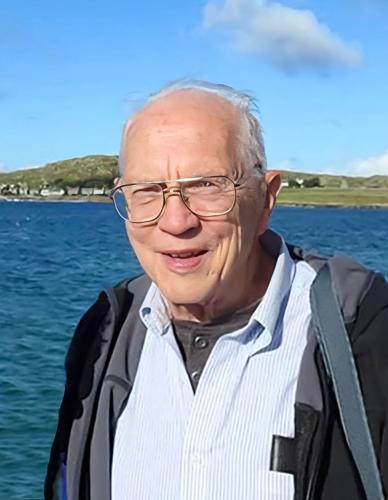
J. Edward Barrett (1932-2023), a biblical scholar and philosophical theologian, was engaged in meaningful and thoughtful conversations up until his death on April 26, 2023. His most recent exchanges occurred with a group of committed and curious thinkers (aka “The Porch Group”) that he hosted weekly on his screened-in porch in Brevard, NC.
Ed grew up in Philadelphia and graduated from Susquehanna University and Princeton Theological Seminary. While serving as pastor of the Presbyterian congregation in Glassboro, New Jersey, it became increasingly clear to him that he wanted to teach, so he earned his PhD from St. Andrew’s University in Scotland, then became a professor of Religion and Philosophy at Muskingum College.
Highlights at Muskingum include: teaching his favorite course, Global Issues and Values; being asked by the African American students on campus to serve as the faculty rep on the trip to attend Martin Luther King Jr.’s funeral in Atlanta; leading students January-term tours of Israel and Greece; hosting distinguished speakers on campus like Victor Frankel and John Cobb; writing three books (How Are You programmed?, Faith in Focus: A Compact Introduction to Christian Theology, and Mapping Tomorrow’s Planet: Ecological Reverence in the Global Village); teaching in Taiwan and Hong Kong and researching at the World Council of Churches in Geneva; lecturing against the Vietnam War across the three-state region as part of an informal speaking circuit during the late 60s and early 70s; playing noon basketball; coaching the women’s swim team; and engaging in thought-provoking and truth-seeking conversations with his colleagues across all disciplines.
Ed was a founding member of the Highlands Institute for American Religious and Philosophical Thought and spent the early years of his retirement actively engaged with this international community of scholars interested in the interface between religion and philosophy. Ed loved sailing on the Chesapeake, singing, playing the piano and ukulele, writing poetry, playing with his springer spaniels, and cheering for his daughters and grandchildren in all their activities.
Ed and his life partner, Suzanne, celebrated their 64th wedding anniversary this year – a partnership of love and shared purpose to living out their faith. They retired in Brevard, NC to be near their daughter Jeanne DeJong, her husband Rich, their granddaughters, Annelise (Jake) and Marielle (Cabell) and their great grandchildren Alene and Gerrit. Daughter Betsy Barrett, her husband Tom Journell, and grandsons Mack and Tate loved visiting from Minnesota. At a recent appointment, upon learning about Ed’s scholarly expertise, his doctor asked him to sum up the meaning of life. Ed responded, “Love your neighbor” and “Be a blessing.”
A service of remembrance and thanksgiving will be Saturday, June 10 at 3 p.m. at the Lutheran Church of the Good Shepherd in Brevard.
Gifts in his memory may be given to Sharing House or the Mission Endowment Fund of the LCGS, both of which support people in need in Transylvania County and worldwide, representing Ed’s commitment to the love of God for all people.
Mission Endowment Fund of Lutheran Church of the Good Shepherd
22 Fisher Rd, Brevard, NC 28712
Sharing House, Transylvania Christian Ministry, Inc
https://www.sharinghouse.org/
164 Duckworth Ave, Brevard, NC 28712
A Tribute to Ed Barrett by Mike Hogue
J. Edward (Ed) Barrett, one of (H)IARPT’s founding members, died on April 26, 2023, at the age of 91. Trained at Princeton Theological Seminary and St. Andrews University, Ed taught religion and philosophy at the undergraduate level for many years. He authored several articles and books and gathered people around him for deep discussions long after he retired from active scholarship and teaching. In recent years, he hosted a weekly philosophical salon, “The Porch Group,” at his home in Brevard, NC. A beloved husband, father, grandfather, friend, and teacher, the link to Ed’s obituary is here.
In this brief tribute, I want to share the story of how I met Ed and describe the indirect but deeply meaningful impact he had on my life. It’s an interesting story, but more importantly than that, it says a lot about who Ed was.
I barely knew Ed and only met him in person once. He and his wife, Sue, picked me up from the Asheville, NC airport and drove me to my first (H)IARPT meeting in Highlands, NC. Since he lived near Highlands, Ed had volunteered to help shuttle out-of-town scholars from the airport to their hotels. I didn’t know who Ed was, and he didn’t know me. We introduced ourselves as we walked out of the airport to the parking lot. I got into the backseat of their car, and we made friendly small talk on the way out of town.
A few minutes later, as we made our way along the winding mountain roads, Ed looked me in the eyes through his rear-view mirror and asked me, “Do you know Gary Hogue?” “Yes,” I said. “Gary is my father.”
My dad is a great guy. I love and admire him very much. But he’s not famous (at least not outside my hometown in Michigan, where he’s a beloved minister)! So, Ed’s question was a big surprise, especially given the context.
“How do you know my dad,” I asked.
“Gary was a student of mine,” Ed said.
Ed then told me he had been a professor of religion and philosophy at Muskingum College in Ohio and my dad (and my mom!!) had been some of his first students in the mid-to late-sixties.
My dad grew up near Cincinnati in a complicated working-class family. His father took his life when he was a young boy. His mother, who worked as a cashier at Kmart, remarried a union leader who drove trucks for the city and yelled a lot at home. My dad was the first person in his family to attend college. He was a voracious, highly motivated student driven by philosophical and theological questions. He eventually earned his MDiv at McCormick Seminary in Chicago, had a brief stint at Heidelberg University, and did doctoral coursework in sociology at (The) Ohio State University. Although he left the academy in response to a call to parish ministry, he never ceased his theological and philosophical pursuits. He introduced me to Alfred North Whitehead’s process philosophy when I was in high school.
This is not a tribute to my dad! But this background about him is important in a tribute to Ed because for as long as I can remember I have been fascinated by my dad’s intellectual journey. I had always wondered how, as a kid from a dysfunctional working-class family in Ohio, he had become so philosophically and theologically inclined.
It turns out that Ed Barrett had a lot to do with it.
Meeting Ed and talking with him on that car ride up the mountain to Highlands answered a lot of questions for me. Although we didn’t talk about ideas or thinkers or texts in any depth, I could tell that Ed had been a great teacher—a teacher of philosophy and theology who was less interested in demonstrating to students or grown children of former students, such as myself, what he knew, than in living with curiosity, taking time to get to know people, and learning with them how to find and forge meaning in a bewilderingly complex and astonishingly interconnected (and sometimes small) world.
Ed was the kind of philosopher-teacher who could change lives, as he had done with my father. It is fair to say that my dad would not have become the person he is (and is still becoming) had Ed not been his teacher. Those of you reading this, especially those of you who are process-relational philosophers, understand the non-trivial meaning of this. And you will also understand, then, that this means that I would not be the person I am still becoming had it not been for Ed. (Of course, this doesn’t mean Ed is to blame for any of the bad stuff. I take full credit for that myself!)
When I wrote to my dad the other day to tell him Ed had died, this is what he had to say: “I found Dr. Barrett’s teaching memorable, inspiring, and challenging. Tillich’s Systematic Theology came out from the University of Chicago Press my Junior year, I think. Dr. Barrett was bold enough to offer a seminary-bound small group of us through it (including Stephen Hasley and Mike McConnell, after whom you are named, and Mom). It was our first exposure to systematic thinking & theology. Only Widick Schroeder’s line-by-line attention to Whitehead’s P & R has had a greater impact on my thinking, mostly because Schroeder interacted with Durkheim, Weber, and Parsons to explore the ‘social’ nature of human life. Your introduction to Ed & his wife on that car ride was serendipitous, to say the least.”
Memorable. Inspiring. Challenging. Bold. Serendipitous. To say the least.
Rest in peace, Dr. Barrett.
Christian Polke (1980-2023)

A Tribute to Christian Polke by Gesche Linde
Some of us, probably most, knew Christian Polke. Christian died on Tuesday, the 25th of April. He became only 42 years old. As a European he, at the time he was born, could have expected to reach the age of 72, and by now the age of 78. Statistically, Christian’s death was outside the average, but then, Christian was average in no respect. Statistically, Christian died far too early, but for those who knew him and now miss him, he died far too early anyway. Death came all at a sudden to him, and brutally unexpected to us: his colleagues, his friends, and, of course, his family.
The most-heard comment in the days after the shocking news were spread was “unfassbar”, “incomprehensible”. Incomprehensible not just because death had struck him so prematurely, but incomprehensible also because Christian was a person who could not but radiating sheer energy. He exuded energy with every fiber of his body. Energy made him run rather than walk, with his upper half slightly bent forward as if he wanted his head to arrive before his feet had done so, leaving his companions breathless at his side. He not only used to move quickly but also captured situations quickly. He was quick in his reactions and could make quick decisions. And he was quick in his career. He had studied Protestant Theology at the universities of Heidelberg, Berlin and Tübingen, graduating in 2005, and then received his Th.D. from Heidelberg in 2008, at the age of only 28. At the age of 36 he became Professor of Ethics in the Faculty of Protestant Theology at the renowned university of Göttingen, after having written his habilitation thesis on “Expressive Theism: The Meaning of Talking about God as a Person”. In 2020 he took over the office of Dean of Studies, having to deal with the fatal impact of the pandemic on university life. I know too well the toll this took because I shared his fate.
I met Christian first when I was holding a deputy professorship at Hamburg University in the summer term of 2011, where Christian at that time had the position of research assistant, “Wissenschaftlicher Mitarbeiter”. The year before, his dissertation on “Public Religion in the Democracy: A Study about the Ideological Neutrality of the State” had won the John F. Templeton Award for Theological Promise. In this book, Christian nicely combined his diverse interests in theology, ethics and law, law being something he had also studied for a while. At first, I was very much irritated by him. He displayed a sovereignty unusual for someone his age, and bewildering to a woman devoid of patronage, prone to feelings of inferiority, and neither with talent for nor interest in networking. Christian, by contrast, had a professorial habitus that he must have acquired early in life. Having a true talent for communication, he was famous for knowing everyone and everything. His habit of referring to people by calling them by their first names – which in German indicates close familiarity – drove me crazy: not so much because he extended this habit to the intellectual elite of our times, but mainly because I never knew whom he was talking about, and always had to inquire, thus forced to expose both my ignorance and my outsiderism. Fama est, rumor has it, that even Habermas and the late Pope Benedict, his fellow-Bavarian, to him were just “Jürgen” and “Joseph”. I only caught him out once, quite recently, when he referred to a female colleague of mine at Tübingen University by using her first name: a colleague whom I thought highly unlikely to be on a first name basis with him. Sensing my amazement, if not disbelief, mixed with laughter, he admitted that, even though they had had a joint conference dinner with food and wine, she might not remember.
Luckily, I soon came to understand that Christian not only had integrity but more than that: a golden heart. He was one of the most kind, trustworthy, reliable and helpful people in the Academy I have ever met. His kindness did not stop him from displaying a sharp tongue at occasions: only at his peers, though, never at inferiors. At the last AAR I visited, Denver 2018, the two of us attended a good deal of presentations together, and he was fun. He used to comment on the speakers with a voice clearly audible, his English being impregnated by his strong Bavarian accent, and I sometimes just had to shoo him down. Christian never hid his presence, and he could not have done so even if he had wished to. Although of small stature and light build, he would not be overlooked, nor overheard. Although always on the move, from one city to the other, from one conference to the next: wherever he was, he was there. He was sociable. He liked to laugh. He showed genuine interest in others. He asked questions about one’s family. He was capable of empathy. I am still hearing his slightly nasal voice, and I am still seeing his warm smile, mischievous at times, that lit his eyes and embraced his counterpart. He was one of the most distinct and memorable individuals I have ever encountered.
Christian was one of the not-so-many German Theologians who studied American philosophy and theology. He was interested in pragmatism, and, more generally, in American traditions of political thought, from John Dewey and Richard Niebuhr through today. To him, both political theory and Christian ethics – indeed, Christian dogmatics – were of practical relevance, which is one of the reasons why he engaged himself as a long-standing member of the Social-Democratic Party: a party that at times made him suffer. He actively started to enforce his contacts to the U.S. after he had attended the memorable 2012 conference on “Pragmatism and the Theory of Religion” at the Max Weber Kolleg, Erfurt, organized by Hermann Deuser (my “doctor father”) and Hans Joas. Among the invited speakers were Bob Neville, Wayne Proudfoot, Michael Raposa, Vincent Colapietro, Eilert Herms, Magnus Schlette, and others (including myself). Christian was part of the audience, and he used the opportunity to build a friendship with Bob Neville, who invited him to Boston. By 2013, Christian had joined IARPT. In 2015, he and Christoph Seibert of Hamburg University organized another memorable conference, now on Josiah Royce. Among the speakers were Bob Neville, Michael Raposa, Randy Auxier, Doug Anderson, Magnus Schlette, and others (again including myself). What I recall best, though, is Doug and Randy playing their guitars on a Hamburg sidewalk at night. At the 2018 IARPT conference here at the Catholic Academy in Berlin Randy played again, in the club room on the third floor, and I remember Christian standing beside me: singing loudly, not always hitting the tone, but with greatest joy and enthusiasm.
Christian would have loved to attend the conference we are having now. He would have loved to join the discussions. He would have loved to sing.
Let us honor him. Let us remember him with much respect and even more affection.
